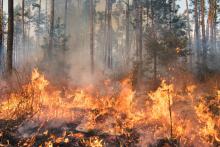Only 11% said that climate change wasn’t relevant at all. Asked how patients have been affected by climate change, about two-thirds said “increased care for allergic sensitization and symptoms on exposure to plants or mold.”
Science supports these views, Dr. Rosario said.
A 2011 study of North American pollen seasons found that some cities had significant increases of 11-27 days, compared with 15 years before.
This year, a New England Journal of Medicine article pointed out the respiratory dangers of increasing wildfires, noting the carbon dioxide, particulate matter, trace minerals, and thousands of other compounds that are unleashed (2018 Mar 8;378[10]:881-3).And a 2017 review noted the impacts of the consequences of climate change, from increased allergies due to heavy precipitation events, asthma prompted by intense tropical cyclones, and allergic conditions caused by extremely high sea levels.

